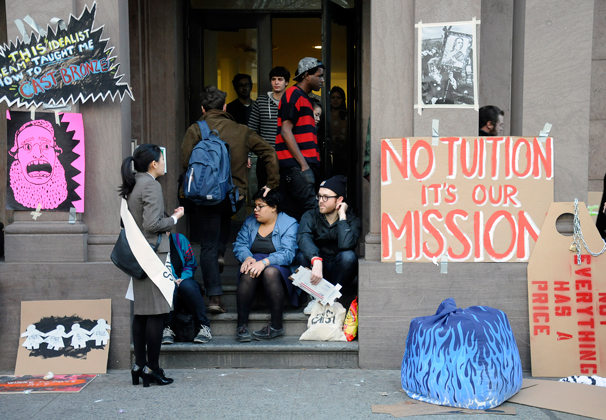
After 18 months of deliberation, the Cooper Union Board of Trustees voted April 21 to effectively end the school’s well-known universal scholarship policy, beginning with freshmen entering Cooper Union in 2014.
Peter Cooper, who founded the art, architecture and engineering university in 1859, had a progressive vision of “equal to the best,” which mostly revolved around the provision of a full scholarship included with admission. The small size of the college of about 1,000 students, combined with the selectivity of the admission process, allowed this model to endure for over 150 years.
Now, all students will still be automatically awarded a smaller scholarship — 50 percent of the $38,500 tuition — in addition to need-based aid. However admissions will remain “need-blind,” according to a statement on the Cooper Union website.
For some, the decision marks the crossing of an institution of higher learning with a business. Peter Buckley, associate professor and unofficial historian of Cooper Union, stated his opposition to the decision of the Board of Trustees.
“Peter Cooper believed in a high social purpose,” Buckley said. “Now, from 2014, we are to be a brand offering a marketable product.”
Although the policy only affects the students entering Cooper Union from 2014 onward, current students said they feel strongly about the historical, social and moral ramifications of this vote.
“What they fail to understand is that the excellence of this institution is in the students, in the faculty and in the conversations we hold, largely due to the fact that we come as equals,” said Andy Overton, a freshman in the Cooper Union School of Art. “No one questions, or even
thinks to question, how much money your parents have, how many jobs you worked in high school or who is sacrificing what for you to be here. It is understood that we each earned our way here.”
The Students for a Free Cooper Union Facebook page was created as part of the student-led efforts to respond to the implemented tuition costs by hosting protests and panel discussions.
Cooper Union was one of 12 traditionally tuition-free universities in the United States. Many of these institutions, while mostly free, have different tuition systems. For example, since its founding, the College of the Ozarks in Missouri has required students to participate in work study for tuition, with an extra summer work program for room and board. Berea College in Kentucky also conducts a slightly less rigorous work study program, in conjunction with need-based aid.
“We wish every college could go without charging tuition, but that’s not a reality today,” Chris Maguire, the associate vice president of integrated marketing and communications at Berea College, said of the alternate payment policy. “We can’t imagine a scenario where we would charge under the way our model is set up presently.”
In a statement, the Board of Trustees explained other options that were considered during the deliberation process, including relying on rent income from its ownership of the land the Chrysler Building is built on, or downsizing the university, but these would not be enough to sustain the university.
“Being mostly alumni ourselves, we share your sense of the loss of this extraordinary tradition,” the statement said. “In the final analysis, however, we found no viable solutions that would enable us to maintain the excellence of our programs without an alteration of our scholarship policy.”
Overton echoed the apparent contradiction to Peter Cooper’s original intent and alluded to the possibility of future difficulties with this first step.
“I have no predictions yet for the future,” he said. “I’m still stuck on the fact that, for many, Cooper has been fundamentally altered for the worse. The destruction of Cooper’s founding mission and intent is the largest loss yet. The ramifications have only just begun.”
A version of this article appeared in the Monday, April 29 print edition. Gabriela Kaufman is a contributing writer. Sofia Ferrandiz is a staff writer. Email them at [email protected].























































































































































E.J.S. • May 1, 2013 at 11:07 am
The school will be continuing a need-based sliding scale. That alone is still revolutionary in higher-education tuition. For all of the trust fund kids with millionaire parents who wind up in Cooper Union – you have zero sympathy from me.